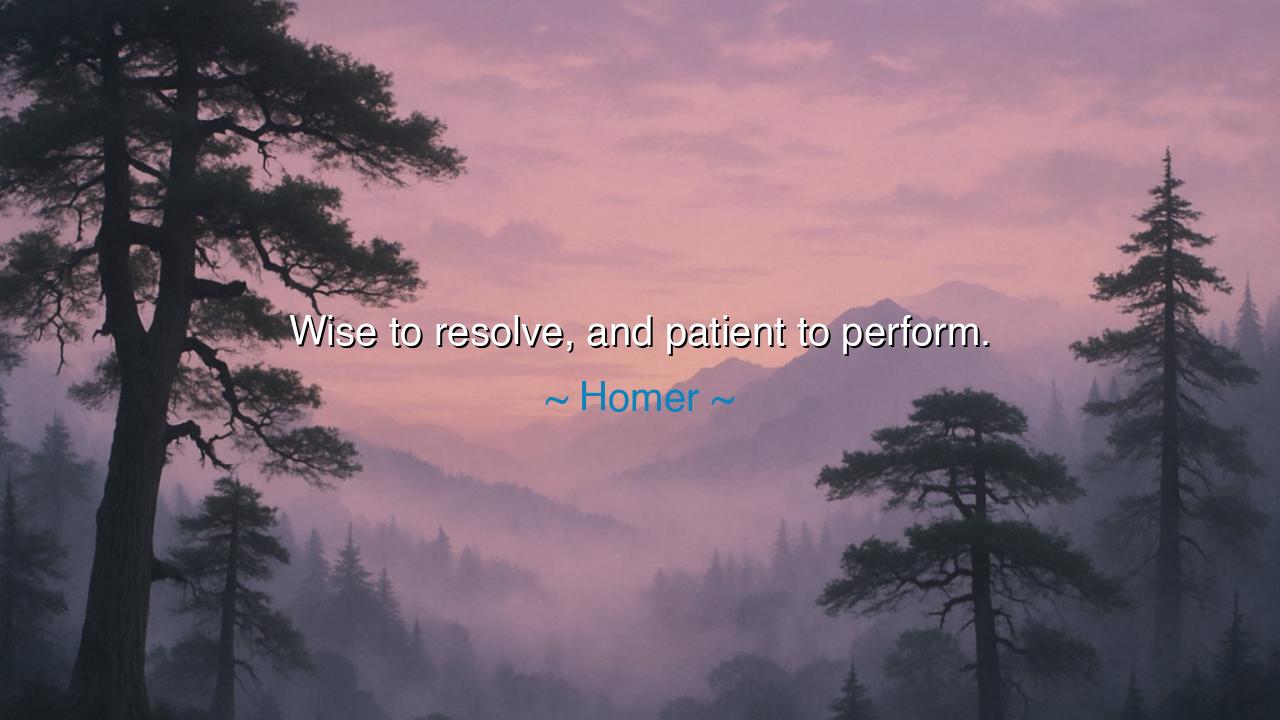
Wise to resolve, and patient to perform.






The ancient poet Homer, father of epic song and guardian of the wisdom of the Greeks, once uttered a teaching that is as much a guide for rulers as it is for common men: “Wise to resolve, and patient to perform.” In these words, he captures the very essence of human endeavor: that noble actions are born of two forces — the clarity of wisdom in deciding, and the endurance of patience in carrying out what has been decided. To possess one without the other is to be unbalanced; to unite them is to live as a hero.
The first task, Homer teaches, is to be wise to resolve. The mind must be sharp, discerning, and thoughtful when choosing a course of action. Rash resolutions lead to ruin, but wise ones open the path to victory. Yet wisdom in choice alone is not enough. Once resolved, the spirit must be patient to perform — to endure delays, to withstand hardship, and to persist until the resolution becomes reality. The marriage of wisdom and patience is the true mark of greatness.
We see this truth embodied in the tale of Odysseus, the hero of Homer’s own Odyssey. Wise was he to devise the stratagem of the Trojan Horse, resolving the long war with cunning where strength had failed. Yet more patient still was he in his long journey home, enduring storms, monsters, temptations, and despair for ten long years. His greatness lay not merely in his cleverness, but in his patience to perform the resolve of returning to Ithaca and reclaiming his home.
History also reveals this principle in the life of George Washington. At the dawn of the American Revolution, many clamored for immediate and reckless action against the greatest empire of the age. Yet Washington was wise to resolve upon a strategy of endurance, refusing to squander his army in rash assaults. And he was patient to perform, leading his weary soldiers through winters of hunger and despair, waiting for the right moment to strike. By holding wisdom and patience together, he secured a nation’s freedom.
The danger of ignoring Homer’s counsel is plain. To resolve without wisdom is folly; to resolve wisely but lack patience is futility. How many brilliant plans have perished because their makers grew weary of the slow labor required to bring them forth? The seed, though alive with promise, bears no fruit if torn from the soil too soon. Likewise, the soul must learn to both discern carefully and endure steadfastly, for only then will purpose ripen into achievement.
This ancient teaching also guides the smallest of tasks. A student may resolve to master knowledge, but without patience in study, the resolution is nothing. A craftsman may resolve to shape beauty from stone, but without patient toil, the work remains unfinished. In every field of life, wisdom in choosing and patience in enduring form the pillars of success.
Therefore, O children of the future, let Homer’s words be etched upon your hearts: “Wise to resolve, and patient to perform.” When faced with choice, seek counsel, think deeply, and resolve with wisdom. And when the path grows long, do not falter, but be patient until the end. For in the union of these two virtues lies the strength of nations, the triumph of heroes, and the quiet victory of every soul that endures to fulfill its purpose.






AAdministratorAdministrator
Welcome, honored guests. Please leave a comment, we will respond soon